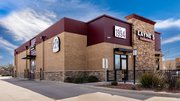News
Cancer research institute issues warning about McDonald's diet
June 23, 2008
WASHINGTON — Health experts at the American Institute for Cancer Research (AICR) have announced a warning about crash dieting in response to the so-called "McDonald's Diet" weight-loss story in the headlines. The AICR has determined the man's weight-loss effort was a crash diet, not the kind of behavior change that results in safe, permanent weight loss. Chris Coleson, a 42-year-old Quinton, Va., man who lost 80 pounds in six months by eating most of his meals at McDonald's, has attracted much media attention. Last December, at 278 pounds, the 5-foot-8 Coleson started eating two meals a day at the fast-food chain (he skips breakfast). Coleson avoided burgers and fries and ate mainly salads and wraps and now weighs 199 pounds. According to AICR nutritionist Sarah Wally, RD, "We applaud Mr. Coleson's resolve, and his recognition that it was time to take action. Being overweight increases risk for heart disease, stroke, hypertension and Type 2 diabetes, and a recent AICR Expert Report concluded that excess body fat is a major cause of many cancers as well." But Wally was less enthusiastic about Coleson's chosen method. "Mr. Coleson's weight loss was the result of extreme calorie deprivation. His reported daily intake — between 1200 and 1400 calories — was far below his body's needs. "Rapid weight loss like Mr. Colson experienced is inevitable when calorie intake is cut so drastically, regardless of what — or where — you are eating. But it doesn't lead to sustainable, long-term weight loss and it can be dangerous," Wally said. The chain offers wraps and salads, which can be healthful options — but which ones you choose, and how many extras you add, can drive up the calorie count quickly. For example, a McDonald's Asian salad with grilled chicken and low-fat vinaigrette is roughly 340 calories. That same salad with crispy — that is, fried — chicken and regular dressing contains 580 calories and provides more than half of the recommended fat intake for the entire day. Therefore, the AICR does not recommend Coleson's experience or McDonald's as a haven for dieters. While some of the chain's offerings can fit into a healthful diet, the majority of menu options are calorie-dense choices that have been shown to promote weight gain, according to a press release. For free information on achieving safe, effective, health-protective weight loss and other ways to reduce cancer risk, visitwww.aicr.org.
 ChatGPT
ChatGPT Grok
Grok Perplexity
Perplexity Claude
Claude








